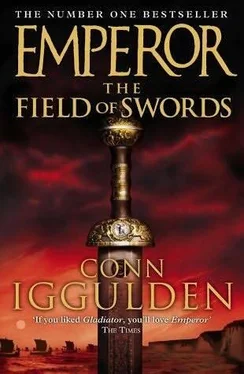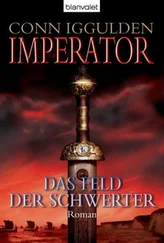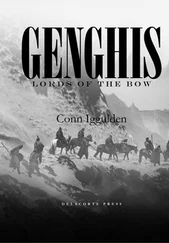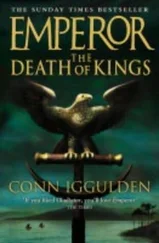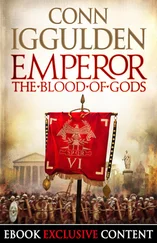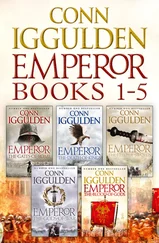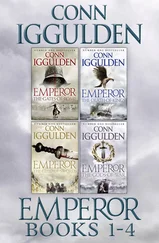“No man rules Rome alone, my friend,” Crassus murmured.
Pompey glanced sharply at him. “Show me the laws I have broken! My tribunes are appointed rather than elected. They were never meant to bring the work of the Senate to a complete halt, and now they do not.”
“The balance in the system has been altered, Pompey. It is not a minor change you have brought about.
The tribunes were the voice of the mob. You risk a great deal in altering that. And the Senate are discovering new teeth if they act together against you,” Crassus replied.
Pompey’s shoulders slumped in weariness, but Crassus felt no sympathy. The man went at politics as if every problem could be met head-on. He was a fine general but a poor leader of a city, and the last one to know that truth was apparently Pompey himself. The very fact that he had asked to meet Crassus privately was proof of the problems Pompey faced, even though he would not ask outright for advice.
“They were meant to limit the power of the Senate, Pompey. Perhaps they were wrong to block you so completely, but replacing them has earned you nothing but anger in the city.”
Pompey flushed again and Crassus continued quickly, trying to make him understand. “If you restore their posts to the vote, you will regain a great deal of the ground you have lost,” he urged. “The factions will believe they have won a victory and fall apart. You should not let them grow any stronger. By Jupiter himself, you should not. You have made your point. Let it be known now that you care as much as they for the traditions of Rome. The laws you passed cannot be undone, after all.”
“Let those sneering dogs back in to veto me?” Pompey snapped.
Crassus shrugged. “Those, or whoever else the citizens elect. If it is the same men, you may have a difficult time of it for a while, but this is not an easy city to rule. Our people are fed on a diet of democracy from childhood. At times, I think they have dangerously high expectations. They do not like to see their representatives taken from them.”
“I will think about it,” Pompey said reluctantly, looking away across the forum.
Crassus doubted he fully understood the danger. As far as Pompey was concerned, the resistance in the Senate was a passing thing, not the kernel that could lead to open rebellion.
“I know you will make the right decision,” Crassus said.
Julius rubbed his face wearily. How long had he slept, an hour? He couldn’t remember exactly when he had passed out, but he thought the sky had been growing light. The colors seemed to have been washed out of the province, and Mark Antony’s voice had taken on a whining tone Julius had not noticed before.
While half the legions were bleary-eyed and pale, Mark Antony looked as if he were ready for a parade, and Julius was convinced he felt a moral superiority over those who had indulged the night before. The general’s lips pursed as he listened to Julius’s report of the agreement with Mhorbaine.
“I wish you had consulted me before you pledged your support,” Mark Antony said, barely hiding his irritation at what he had heard.
“From what Mhorbaine said, this Ariovistus would be trouble for us at some point. Better to deal with him now, before he is so deeply rooted we’d never be able to throw him back over the Rhine. We do need allies, Mark Antony. The Aedui have promised three thousand of their cavalry at my disposal.”
Mark Antony struggled with his temper for a moment. “Yes, they will promise us anything, sir. I will not believe it until I see them. I warned you Mhorbaine is a clever leader, but it looks as if he has somehow managed to set the two most powerful armies in Gaul at each other’s throats. No doubt Ariovistus has pledged friendship as well, with the Aedui profiting from a war that could break both of their enemies.”
“I’ve seen nothing in Gaul that could stand against us,” Julius said dismissively.
“You have not seen the Germanic tribes. They live for war, keeping a professional class in the field at all times, supported by the rest of their people. And in any case, Ariovistus is…” Mark Antony sighed.
“Ariovistus cannot be touched. He is already a friend of Rome, named so ten years ago. If you take the field against him, the Senate could well remove your command.”
Julius turned and gripped the larger man by the shoulders. “Do you not think this is something I should have been told?” he demanded.
Mark Antony looked back at him, flushing. “I did not think you would make such a promise to Mhorbaine, sir. You barely even know the man! How could I possibly have foretold that you would pledge the legions nearly three hundred miles across the country?”
Julius dropped his hands from his general and stood back. “Ariovistus is a ruthless invader, Mark Antony. My only allies have asked me to help them. I’ll tell you honestly that I do not care if Mhorbaine hopes to see us broken against each other or not. I do not care if Ariovistus is twice the warrior you tell me.
Why do you think I brought my legions to Gaul? Have you seen this land? I could drop a handful of seeds anywhere and see corn spring up before I could turn round. There are forests enough to build fleets, herds of cattle so great they could never be counted. And beyond Gaul? I want to see it all. Three hundred miles is just a step of the way I have in mind. We are not here for a summer, General. We are here to stay, just as soon as I have cut the path for the rest to follow.”
Mark Antony listened in astonishment. “But Ariovistus is one of ours! You can’t just-”
Julius nodded, holding up a hand. Mark Antony fell silent.
“It will take a month to build a road from here to the plain for the ballistae and onagers. I do not intend to go to war without them again. I will send a messenger to this Ariovistus, asking for a meeting. I will address him with the respect due to a friend of my city. Will you be satisfied then?”
Mark Antony sagged with relief. “Of course, sir. I hope you are not offended at my words. I was thinking of your position at home.”
“I understand. Perhaps you could send a messenger to me to receive the letter,” Julius replied, smiling.
Mark Antony nodded and left the room. Julius turned to Adàn, who had listened to the conversation with an open mouth.
“What are you gaping at?” Julius snapped, instantly regretting the words. His head throbbed and his stomach felt as if it had been squeezed dry by vomiting in the night. A vague memory came of staggering out to the bathhouse in the dark and losing great gushes of dark fluid into the gutters there. Only yellow bile remained, but still it churned and surged up his throat.
Adàn chose his words carefully. “It must have been this way for my country, once. Romans deciding the future for us, as if we had no say at all in the matter.”
Julius began a sharp reply, then thought better of it. “Do you think the men of Carthage wept over their conquests? And how do you think your people decided the fate of those they found when they came to Spain? These Celts came from some foreign land. Do you think your ancestors troubled themselves over the original inhabitants? Perhaps even they were invaders from some distant past. Do not think your people are better than mine, Adàn.”
Julius gripped the bridge of his nose, closing his eyes against the throbbing headache. “I wish I had a clear head to tell you what I mean. It is more than just the strength that matters. Carthage was strong, but beating them changed the world. Greece was once the greatest power, but when they weakened, we came and made them ours. Gods, I drank too much wine for an argument this early.”
Adàn did not interrupt. He sensed that Julius was on the edge of something important, and he strained forward in his chair to hear. Julius’s voice had a hypnotic quality, almost a whisper.
Читать дальше
Конец ознакомительного отрывка
Купить книгу
